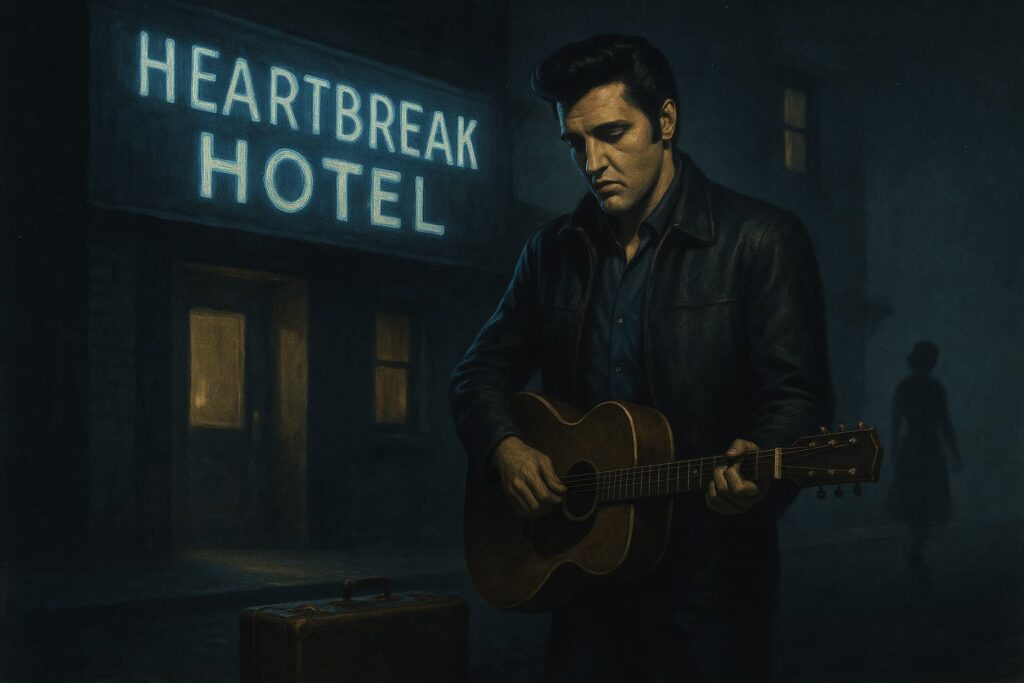
A Lonesome Echo: The Haunting Melancholy of Unrequited Love and Despair
Ah, “Heartbreak Hotel.” Just the title alone conjures a specific image, doesn’t it? For many of us, it’s not just a song; it’s a timestamp, a vivid snapshot of a moment when the world tilted on its axis. And at the epicenter of that seismic shift was a young man from Tupelo, Mississippi, by the name of Elvis Presley.
When “Heartbreak Hotel” was unleashed upon the unsuspecting public in January 1956, it wasn’t merely a hit; it was an explosion. It rocketed up the charts, becoming Elvis Presley’s very first number-one record on the Billboard Top 100 Best Sellers in Stores chart, holding that coveted spot for eight consecutive weeks. It wasn’t just an American phenomenon, either; it found similar success in the UK, reaching a respectable No. 2. This wasn’t just a song; it was a cultural phenomenon, a sign of something new and electrifying brewing beneath the surface of polite society.
The story behind “Heartbreak Hotel” is as poignant as the song itself. It’s often said that art imitates life, and in this case, the inspiration for this melancholic masterpiece came from a real-life tragedy. The song was co-written by Mae Boren Axton and Tommy Durden, and the initial spark came from a newspaper article Mae read about a lonely man who jumped to his death from a hotel window, leaving behind a suicide note that simply read, “I walk a lonely street.” That chilling phrase resonated deeply, painting a picture of profound isolation and despair. Mae then presented the idea to Tommy, and together they crafted the lyrics, drawing on that unsettling sense of abandonment and hopelessness.
But it was Elvis’s delivery that truly brought this narrative to life. His voice, still raw and untamed, perfectly captured the desolate landscape of the song. You could feel the weariness in his tone, the ache of a soul adrift. It wasn’t just singing; it was an embodiment of the character, a man “so lonely he could die.” The imagery of a “lonely street,” a “broken-hearted love,” and the “blue and lonely” atmosphere of the hotel itself painted a stark, unromanticized picture of heartbreak. This wasn’t the saccharine, idealized love of pop songs past; this was the gritty reality of human despair.
For us older listeners, “Heartbreak Hotel” evokes a powerful sense of nostalgia, transporting us back to a time of innocence and burgeoning rebellion. We remember hearing that opening guitar riff, so deceptively simple yet so instantly recognizable, followed by Elvis’s mournful vocals. It was a sound unlike anything we’d heard before, a lament that resonated deep within our own youthful anxieties and dreams. It spoke to the universal human experience of feeling lost, abandoned, and utterly alone, a feeling that, no matter our age, we can all, at some point, understand. The raw emotion, the quiet desperation, and the haunting echo of that iconic vocal performance have etched themselves into the very fabric of our musical memories. It wasn’t just a hit song; it was a watershed moment, an invitation to a new era of music, and a melancholic masterpiece that continues to resonate with its timeless depiction of the deepest human sorrow. Even now, all these years later, it still has the power to give us pause, to take us back to that “lonely street” and feel, just for a moment, the chill of the “Heartbreak Hotel.”